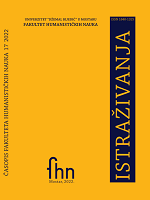AKADEMSKA MOTIVACIJA, EMOCIONALNA INTELIGENCIJA, STRATEGIJE EMOCIONALNE REGULACIJE I PORODIČNA AFEKTIVNA VEZANOST KAO PREDIKTORI ANKSIOZNOSTI STUDENATA
ACADEMIC MOTIVATION, EMOTIONAL INTELLIGENCE, STRATEGIES OF EMOTIONAL REGULATION AND FAMILY ATTACHMENT AS PREDICTORS OF STUDENT’S ANXIETY
Author(s): Dijana Ivanišević, Andrea VlašićSubject(s): Higher Education , Educational Psychology, Social psychology and group interaction, Behaviorism, Sociology of the arts, business, education
Published by: Fakultet humanističkih nauka, Univerzitet »Džemal Bijedić« u Mostaru
Keywords: academic motivation; emotional intelligence; emotional regulation; family attachment; anxiety;
Summary/Abstract: The aim of this research was to explore the role of academic motivation, emotional intelligence, emotional regulation strategies, and affective family attachment in explaining student anxiety. Participants of this cross-sectional research were 897 university-level students (51.8% female) with an average age of 22.84 (SD= 4.51). The main statistical analysis applied in the research is multiple regression analysis, and the obtained results proved that intrinsic motivation to learn, the extrinsic motivation – identified type, the ability to accept and understand emotions, the ability to manage and regulate emotions, as well as anxiety as a dimension of family attachment and preoccupied style of family attachment (F(18.876)= 12.71, p < .01), have a significant role in explaining 20.7% of the variance of student’s anxiety. Higher level of anxiety and anxious reactions were found in students with more ability to accept and understand emotions and more anxiety and extrinsic motivation – identified. Also, a higher level of anxiety and anxious reactions were found in students with a preoccupied style of family attachment, with lower ability to manage and regulate the emotions and lower intrinsic motivation to learn. Therefore, the problem of anxiety in the student population needs additional attention, and explore potential risk and protective factors, in order to approach the systematic planning and implementation of prevention programs aimed at developing and improving appropriate motivational and emotional competencies that would help students transition through periods of crisis and the development of more mature and resilient personalities.
Journal: Istraživanja
- Issue Year: 2022
- Issue No: 17
- Page Range: 181-200
- Page Count: 20
- Language: Bosnian

